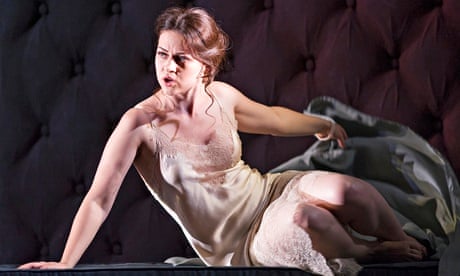It's more than a quarter of a century since Glyndebourne last staged La Traviata. Those who have been awaiting its return, and who like their Verdi elegant and straightforward, with the emphasis on the strength of the vocal performances, will enjoy Tom Cairns's new production.
Hildegard Bechtler's designs update the story without flamboyance to near the present day – the guests at Violetta's party could have wandered in off the Glyndebourne lawns, and whatever the nature of her incurable illness, it isn't, post-penicillin, likely to be TB. It all works well dramatically, with just the nagging sense that the production could have been more detailed and psychologically penetrating. There are occasional suggestions that Cairns had toyed with developing subsidiary strands and characters, such as the maid Annina, but thought better of it, just as there are moments when some protagonists seem two-dimensional and lack the texture that meticulous direction could have provided.
This is not Traviata presented as a critique of money and class and all their pretensions and hypocrisies – it is Glyndebourne, after all – but a production that places Violetta's tragedy at its centre. Each act opens with her lying on the bed on which we assume she will die, though in its final moments Cairns's production takes a leap into bare-stage abstraction for her solitary demise.
Having Venera Gimadieva in the role makes such an approach much easier to bring off. She is a soprano of huge presence, compelling to watch, with a voice of thrilling security and range, and a special quality to her quieter singing that makes you hang on every note. It's a remarkable, touching Glyndebourne debut, and she's paired with an Alfredo, Michael Fabiano, whose singing has real zest and attack, though his performance is one that would have benefited from closer attention dramatically. Tassis Christoyannis's ramrod-straight Giorgio Germont is a little dull, too, but very well sung, and Mark Elder's conducting has its usual Verdian authority. The London Philharmonic is in the pit; after the success of the Falstaff revival with the Orchestra of the Age of Enlightenment last year at Glyndebourne, this was perhaps a missed opportunity for a Traviata with a period orchestra.

Comments (…)
Sign in or create your Guardian account to join the discussion